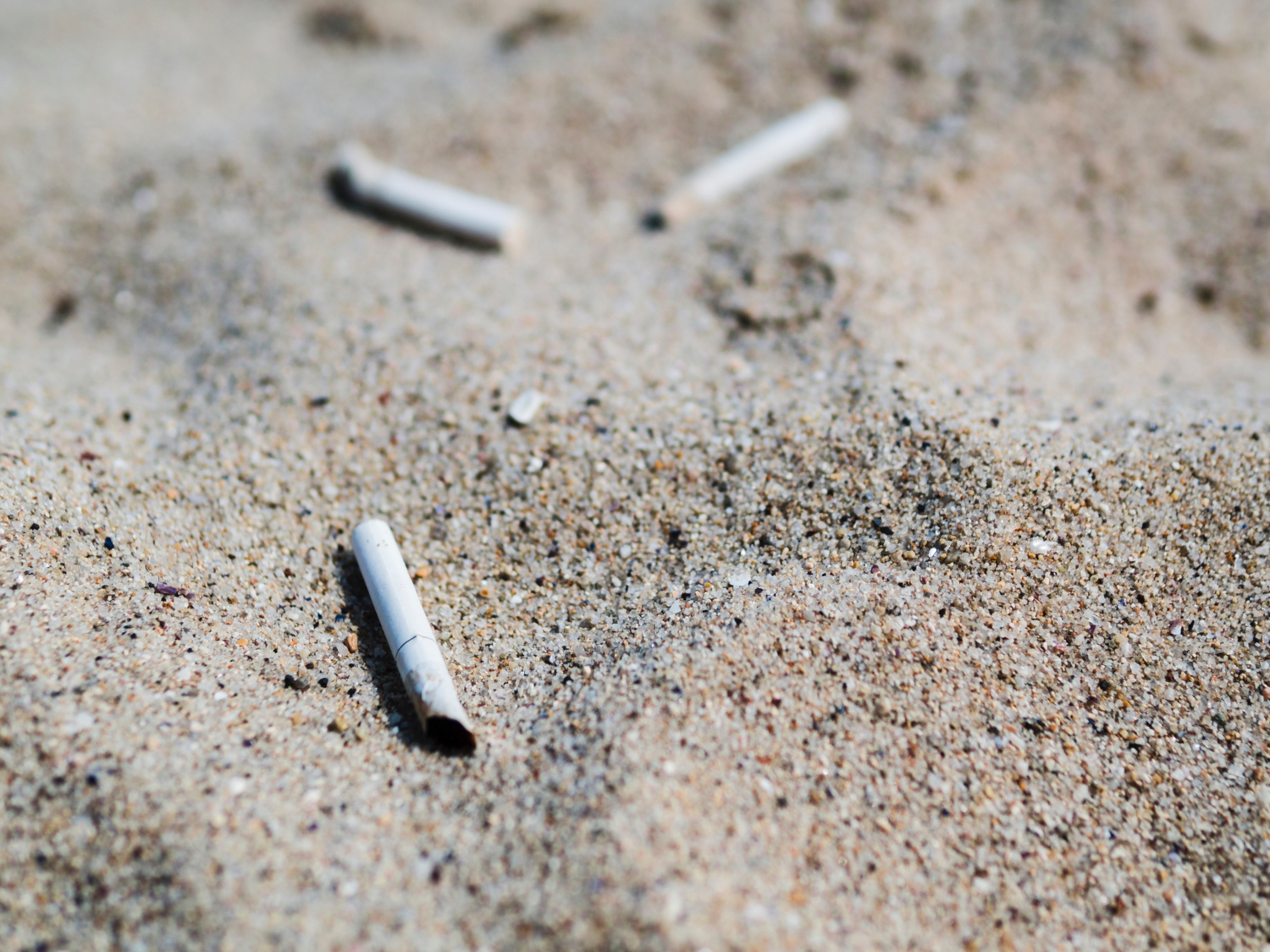
While efforts to curb plastic straws and bags gain momentum, cigarette butts remain a significant pollutant. Every year, Ocean Conservancy’s International Coastal Cleanup volunteers pick up more discarded cigarette butts than any other type of litter. Whether carelessly discarded by smokers or washed up by the waves, cigarette filters contain harmful chemicals. Learn why cigarette butts harm marine life and how you can help.
Cigarette Butts Contain Toxic Chemicals
Cigarette butts are a persistent form of plastic pollution containing toxic chemicals and heavy metals. They are made of cellulose acetate, a synthetic plastic that takes years to degrade in the environment, and they leach a mixture of chemicals into soils, waterways, lakes, and oceans. Once discarded, they wash away into storm drains and are carried to rivers and the sea, contributing to the growing gyre of plastic trash accumulating in our oceans. They also disintegrate into microplastics consumed by marine wildlife and can enter the human food chain. These cigarette butts are so hazardous that they are even more dangerous than other common forms of litter, such as plastic bags and straws.
The toxins released by cigarette butts can kill fish and other aquatic life. They can also poison human beings. For example, asbestos in cigarette filters causes mesothelioma, an aggressive lung and abdomen cancer linked to smoking cigarettes. Smokers who treat outdoor spaces as public ashtrays should be educated that they are polluting the ocean with chemicals that can harm and, in some cases, kill the aquatic animals that depend on them for survival. It could help smokers change their behavior so they don’t create such a large environmental hazard for themselves and others. It does not just affect marine life but also people. In existence for only a few years, vaping is a relatively recent phenomenon. But can vaping cause lung cancer? Research suggests that vaping does not immediately cause lung cancer, while the long-term effects are still being investigated. However, since most vaping juice contains nicotine and hazardous chemicals, vaping can raise lung cancer risk in those who have never smoked and don’t intend to do so.
They Float in the Water
Cigarette butts are common in beach cleanups, and it’s no wonder. Discarded cigarette butts can contaminate the marine environment and harm wildlife. The plastic used to make cigarette filters, cellulose acetate, does not biodegrade in the ocean. As a result, discarded cigarette butts remain in the environment for years, even decades. The chemicals leached from cigarette butts also pose a threat to marine organisms. One cigarette butt can contaminate up to 1000 liters of water, and the toxins absorbed by the butts may leak from the remains into the surrounding ecosystem. The cigarette butts can be ingested by unknown marine animals, which can cause death by choking or starvation. The cigarette butts can also be mistaken for food by sea birds and turtles, which consume them and then become poisoned. Smokers can buy pocket ashtrays to use when smoking outside to lessen the amount of cigarette butt litter. Governmental agencies, environmental organizations and anti-litter campaigns could also help to inform smokers that cigarette butts are not biodegradable and harm the environment. Although these efforts do not always significantly affect smokers’ entrenched habit of flicking their butts onto the ground, they can make a difference.
They Are Mistaken for Food
When careless beachgoers discard cigarette butts on the ground, they leave behind plastic, heavy metals, nicotine, and other chemicals. Eventually, rain and dew wash these pollutants into nearby waterways, which can transport them to the ocean via rivers or drainage systems. Many animals mistake discarded cigarette butts for food, causing them to ingest the toxic substances and choke or poison themselves. Wildlife rehabilitators routinely find cigarette butts in the stomachs of dead seabirds, sea turtles and fish. The toxins trapped in the cellulose acetate filters of cigarette butts are lethal even in small concentrations. A study by Elli Slaughter from San Diego State University showed that a single cigarette butt in a liter of water is deadly to the freshwater crustacean Daphnia and that one cigarette butt in two gallons of water is harmful to all fish. While cigarette butts aren’t the most abundant form of marine debris, they have one of the highest concentrations of toxic chemicals in the world’s waters. As such, we all must work together to eliminate this pollution. Efforts have been underway to ban plastic bags, straws and other items that end up in the ocean, but it’s time we turn our attention to this overlooked and dangerous form of marine debris.
They Are Made of Plastic
Cigarette butts are made of plastic — cellulose acetate, to be precise – not cotton or paper, as some think. They can linger in the marine environment for a long time because, unlike organic debris, they neither photodegrade nor decompose. Their consumption by unknowing marine organisms can result in choking and starvation, and they can also leach toxic chemicals into the water. Whether flicked onto beaches, dropped on streets, or discarded in parks, cigarette butts often find their way into bodies of water, swept there by rain and stormwater systems. They can float and are mistaken for food by animals, which ingest and carry them downstream, potentially affecting humans who eat fish from the ocean.
While people have redoubled their efforts to curb the spread of other forms of litter, cigarette butts remain a major problem. They make up most of the trash collected by volunteers during international beach cleanups and outnumber even bottle caps, food wrappers, eating utensils and straws combined. While it’s good to see people reducing their smoking habits, smokers must know that their butts are not just unwanted rubbish – they’re dangerous and harmful to pollution. We hope smokers will reconsider their practice when they realize that cigarette butts contain chemicals that can kill some animals that occupy critical positions in our aquatic ecosystems.


